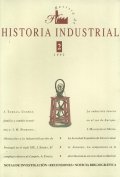Obstáculos a la industrialización de Portugal en el siglo XIX
DOI:
https://doi.org/10.1344/rhi.v0i2.18168Resum
Portugal shared many of the obstacles facing other European countries on the route to modern industrialization: traditional agricultura1 structures, small domestic markets, difficult integration into the international economy, scarce capital resources, insufficient entrepreneurial and technical skills and high illiteracy rates. But, in Portugal, these formed still greater impediments than those to be found in late developing European countries and the vicious circle of poverty was definitely at work in the combination between unprogressive agriculture, slow and imbalanced urbanization and restricted home demand. Natural endowments could hardly be taken as beneficial, either, and foreign trade, thwarted by over specialization, did little to compensate for the smallness of the domestic market. So, in the nineteenth century, both structural and historical conditions combined to raise almost unsurmountable obstacles the industrialization of Portugal. In this light, the divergent path of the Portuguese economy in the late nineteenth and early twentieth centuries compared to other backward nations of Europe is not at all surprising. In fact, Portugal was a very unlikely industrializer.
Descàrregues
Descàrregues
Com citar
Número
Secció
Llicència
The author assigns all rights to the publisher. Creative Commons
The author who publishes in this journal agrees to the following terms:
- The author assigns all intellectual property rights exclusively to the publisher for the entire duration of the applicable intellectual property rights.
- The publisher will distribute the texts under the Creative Commons Attribution License, which allows others to share the work, provided that they acknowledge the authorship, its initial publication in this journal, and the conditions of the license.





